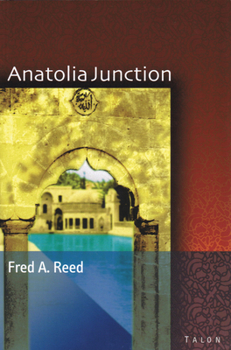Anatolia Junction: A Journey Into Hidden Turkey
This book stands at the point where actuality and legend converge in a land as old as time. From it extends an arid landscape upon which are inscribed the stories of peoples, civilizations, ideas that... This description may be from another edition of this product.
Format:Paperback
Language:English
ISBN:0889224269
ISBN13:9780889224261
Release Date:February 1999
Publisher:Talonbooks
Length:320 Pages
Weight:1.00 lbs.
Dimensions:0.7" x 6.1" x 9.0"
Customer Reviews
2 ratings
A covertly sympathetic view of Turkey
Published by Thriftbooks.com User , 23 years ago
This is a fuzzy book about a fascinating man who shined in a complex world: indeed my natural antipathy towards the culture (Turkish/Islamic) that has all but annihilated mine (Anatolian Greek/Byzantine, the "invading" one of 1919) over the last nine centuries cannot overwhelm my admiration for a society tenacious enough to distribute the words of a perceived 20th century clandestine spiritual leader by way of scribes; nor can the author's failure to draw a clear picture of Said Nursi's ideology for the uninitiated reader eliminate my respect -- despite further reservations in other directions -- for the highly original task he undertook.The author's failure to draw a detailed portrait of Said Nursi is largely compensated by a decent introduction to the history and politics of modern Turkey. The reader may in fact wonder at times whether his real target was Said Nursi's movement or Turkey's contemporary realities. Taking this question one step further, one has to wonder whether the author's decision to center Turkey's "presentation" around Said Nursi is accidental or not: for it can indeed be argued, by the author at least, that the gifted leader exemplified the best qualities or even hopes of the Turkish nation.Of course an individual diverse enough to study "western science" in the backyard of an Armenian church in the outskirts of Van and to travel on a German submarine to Libya in order to instigate religious revolt during World War I can probably provide sufficient material for more than one books; and there is no question that his "inner" view of an otherwise "corrupted" world did touch the hearts and minds of a sizable portion, perhaps even a majority, of Turkey's population. But Said Nursi was also a Kurd who opposed the Kurdish revolt of 1925 and did believe in the unity of Kurds and Turks under Islam, undisturbed by deep differences in language and history -- differences that nowadays seem to be important to quite a few people in Turkey and elsewhere, including the author himself in other environments (such as his "Salonica Terminus", a book that focuses on neighboring Greece and the Balkans, for example)...More generally, it seems that in his approach to Turkey Mr. Reed makes no futile effort to deny the undeniable but goes out of his way to doubt the "unproven": no question that Ataturk was unreasonably authoritarian or that non-Muslims had been singled out for hideously heavier taxation in 1942 or that the contemporary military regime is violating basic human rights; strong hints casting doubts on whether a genocide was committed against the Armenians in 1915 or whether the Istanbul massive pogrom of September 1955 was a state-orchestrated attempt to terrorize and expel the city's Greek minority. (In the first case, the author stresses Armenian atrocities in Van and collaboration with the Russians without mentioning the massacres of Armenians in 1909 or 1896; in the second case, a Turkish at
A Realistic Portrait of The Current Situation in Turkey
Published by Thriftbooks.com User , 23 years ago
The author in this book explores the life of Said-i Nursi, the founder of the Nurcu Movement in Islam. He traces the steps Nursi took throughout his life, and while doing that he presents the readers with a realistic portrait of today's Turkey. Thus this book is both an enjoyable travelogue and a serious sociopolitical analysis. Particularly useful is Reed's description of the Islamiist and Kurdish problems in this country. Unfortunately, however, Reed has examined Nursi basically through the eyes of Nurcus, and therefore the portrait he draws of this religios leader is too positive, approaching a hagiography. The views of Nursi's critics and opponents are not represented adequately.





